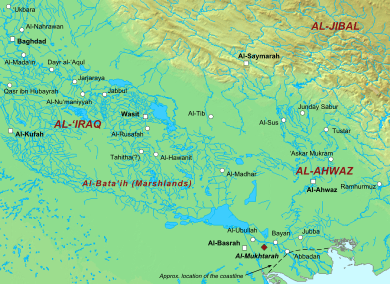Al-Ubulla
Al-Ubulla (Arabic: الأبلة), called Apologos (Greek: 'Απολόγου 'Εμπόριον) by the Greeks in the pre-Islamic period, was a port city at the head of the Persian Gulf east of Basra in present-day Iraq. In the medieval period, it served as Iraq's principal commercial port for trade with India.
Location

Al-Ubulla was situated on the right bank of the Euphrates–Tigris estuary at the opening into the Persian Gulf.[1][2] It was located to the east of old Basra and lay on the northern side of the eponymous canal, the Nahr al-Ubulla, which connected Basra southeastwards to the Tigris river, Abadan (in modern Iran) and ultimately to the Persian Gulf.[3] The 'Ashar neighborhood of modern Basra currently occupies the site of al-Ubulla.[4][5]
History
Al-Ubulla is identified with the ancient city of Apologos mentioned in the Greek manuscript Periplus of the Erythraean Sea.[4] The city dates at least to the Sasanian era (3rd–7th centuries CE), and possibly before.[1] According to the 10th-century chronicler Eutychius of Alexandria, it was founded by the Sasanian emperor Ardashir I (r. 212–224).[4] Toward the end of the Sasanian period, it typically formed part of the territories of the Empire's al-Hira-based Lakhmid vassals.[1]
During the early Muslim conquests in the 630s, al-Ubulla was conquered by the Arab forces of Utba ibn Ghazwan al-Mazini after the defeat of its 500-man Sasanian garrison. In a letter attributed to Utba, he describes the city as the "port of al-Bahrayn (eastern Arabia), Uman, al-Hind (India) and al-Sin (China)".[4] Following the foundation of the Arab garrison town of Basra further inland, al-Ubulla declined in strategic importance but remained a major trade port until the Mongol invasion.[4]
As indicated by the medieval Arabic geographers, al-Ubulla continued to be a large town, more populous than Basra, throughout the Abbasid era (750–1258).[4] Yaqut al-Hamawi praised the city and Ibn Hawqal describes the border lands of the Nahr al-Ubulla as a single extensive garden.[4] Al-Ubulla supplied Basra with fresh water and was noted for its linens and shipbuilding.[4] In 942, the governor of Uman captured the city on his way to Basra during his conflict with its strongman Abu'l-Husayn al-Baridi and his brother Abu Abdallah al-Baridi. According to the historian J. H. Kramers, the events of its occupation demonstrate its weakness as "a bulwark for that city [Basra]".[4]
The 13th-century Mongol invasions brought about a decline of several places in this part of Iraq, including al-Ubulla.[4] The 14th-century traveler Ibn Batuta described it as a mere village and around this time it disappeared from the historical record.[4]
References
- Bosworth 1999, p. 357, note 850.
- Kramers 2000, p. 765.
- Kramers 2000, pp. 765–766.
- Kramers 2000, p. 766.
- Gibb 1962, p. 281, note 40.
Bibliography
- Bosworth, C.E., ed. (1999). The History of al-Ṭabarī, Volume V: The Sāsānids, the Byzantines, the Lakhmids, and Yemen. SUNY Series in Near Eastern Studies. Albany, New York: State University of New York Press. ISBN 978-0-7914-4355-2.
- Gibb, H. A. R. (1962). The Travels of Ibn Battuta, A.D. 1325-1354, Volume 2. The Hakluyt Society at Cambridge University Press.CS1 maint: ref=harv (link)
- Kramers, J. H. (2000). "Ubulla". In Bearman, P. J.; Bianquis, Th.; Bosworth, C. E.; van Donzel, E. & Heinrichs, W. P. (eds.). The Encyclopaedia of Islam, New Edition, Volume X: T–U. Leiden: E. J. Brill. pp. 765–766. ISBN 90-04-11211-1.